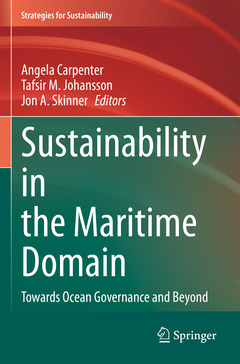This volume explores options for a sustainable maritime domain, including maritime transportation, such as, Maritime Spatial Planning (MSP), maritime education and training, maritime traffic and advisory systems, maritime security. Other activities in the maritime domain covered in the book include small-scale fisheries and sustainable fisheries, and greening the blue economy. The book aims to provide the building blocks needed for a framework for good ocean governance; a framework that will serve through the next decade and, and hopefully, well beyond the 2030 milepost of the UN Agenda for Sustainable Development. In short, this book brings together the problems of the current world and sustainable solutions that are in the development process and will eventually materialize in the not so distant future. Additionally, the book presents a trans-disciplinary analysis of integral sustainable maritime transportation solutions and crucial issues relevant to good ocean governance that have recently been discussed at different national, regional and international fora, highlighting ongoing work to develop and support governance systems that facilitate industry requirements, and meet the needs of coastal states and indigenous peoples, of researchers, of spatial planners, and of other sectors dependent on the oceans.
The book will be of interest to researchers across many disciplines, especially those that are engaged in cross-sectoral research and developments in the maritime transport sector and across the wider maritime domain. To this end, the book covers areas including natural and social sciences, geographical studies, spatial planning, maritime security and gender studies, as they relate to transport and the wider maritime sector. In addition, the book explores frameworks for sustainable ocean governance being developed under the UN?s Agenda for Sustainable Development to 2030. It will also look beyond the 2030 milepost under that Agenda, and will be of use to national and international policymakers and practitioners, government actors at the EU and other regional and national levels and to researchers of ocean governance, sustainability and management, and maritime transport.



